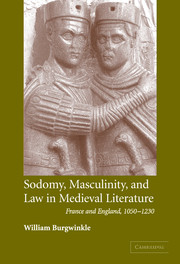Conclusion
Published online by Cambridge University Press: 22 September 2009
Summary
When a modified Athusserian paradigm is brought into an intimate connection with psychoanalysis and anthropology, it provides the basis for elaborating the relation between a society's mode of production and its symbolic order. This … opens the possibility for understanding how the subject is sexually, as well as economically, “captated.”
Saint Anselm defended his reluctance to prosecute sodomy in 1102 with the argument that it was already so commonly practiced that people would have difficulty recognizing it, or themselves within that category. Such a statement could not have been made by the end of that century, when sodomy had become a matter of discourse and persecution. In the intervening years, increased attention to celibacy, monastic rules, marriage practices, and the status of knighthood had the effect of calling attention to the performative nature of masculinity, to its ritualization and theatricalization. Institutions responded by setting up ever more rigorous criteria by which men earned, or failed to earn, their masculine status; and accusations of sodomy began to feature in these attempts to discipline masculine subjects by controlling and patrolling gender barriers. The accusations one finds in the texts discussed here had the effect of outlining acceptable parameters of behavior and establishing an outside to masculinity such that some males make it in and others clearly do not. But they also had the undeniable if unwitting effect of calling such parameters into question.
- Type
- Chapter
- Information
- Sodomy, Masculinity and Law in Medieval LiteratureFrance and England, 1050–1230, pp. 200 - 202Publisher: Cambridge University PressPrint publication year: 2004

